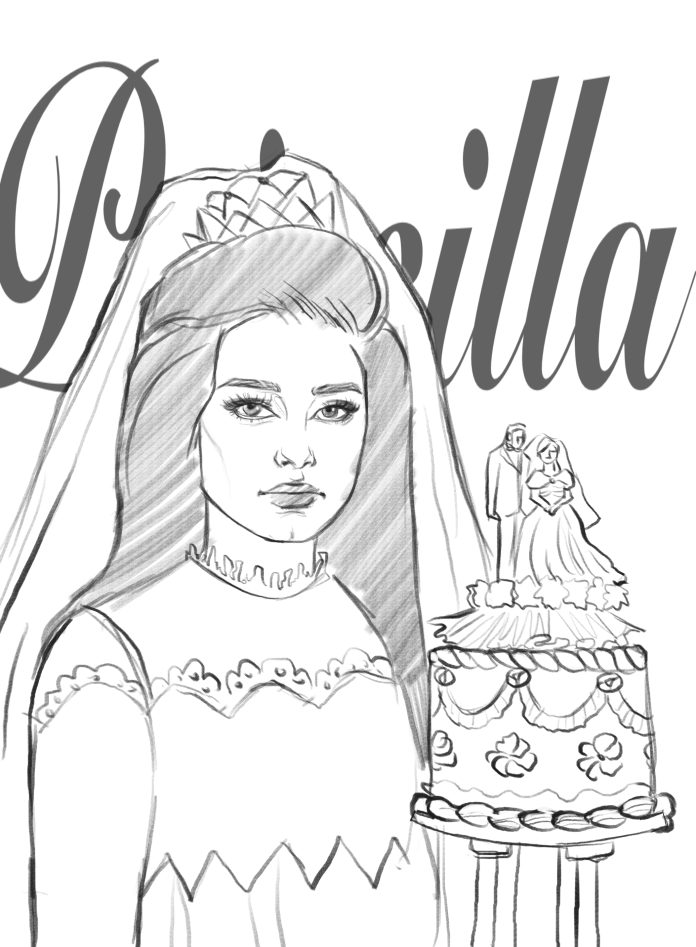Elizabeth Brady ’25 is a public policy major and an English minor, and she is a member of Alpha Chi Omega. She loves art, music and movies. Email her at eabrady@wm.edu.
The views expressed in this article are the author’s own.
The legacy of Elvis Presley is an oft-trodden path, most recently tracing to Bhaz Luhrmann’s frenetic and controversial 2022 biopic with Austin Butler’s painful method acting. Every memoir, biography, eulogy and career retrospective has built and fortified a story so entrenched, so emblematic, so American that to dismantle it would be a Herculean task.
Sofia Coppola’s “Priscilla” does not attempt to throw stones at this ironclad legacy; instead, Coppola chooses to construct something of her own. “Priscilla,” released on Nov. 3 and now available at the viewing pleasure of all interested College of William and Mary students, is about Priscilla Presley, through and through. It is quiet, feminine, honest and engaging, and it looks really good doing it.
If Sofia Coppola can do one thing, it’s cast a movie. Both “Virgin Suicides” and “Marie Antoinette” are absolutely stacked. “Priscilla” is no different, casting Cailee Spaeny as the perfect Priscilla. She is absolutely gorgeous, but with her command of her micro-expressions, her consistency and her complete embodiment of Priscilla, it would be impossible to mistake her for just a pretty face. Her supporting actor Jacob Elordi matches her line-for-line, a strong testament to the superfluity of method acting.
The question of what defines good biopic casting has been a frequent one as of late. Elordi and Spaeny bear a passing resemblance to their real-life counterparts, but their chemistry and the feeling of truth in their interactions is what takes them to a higher caliber than a special effects makeup team or a cabal of accent coaches ever could. Elordi is a visually and physically overwhelming presence on the screen; he takes up the entire vertical of some shots, and the framing of shots is done to place him as the deciding factor of the viewer’s eye. He defines the space, in much the same way the real-life Elvis capitalized on attention, conversation and gaze.
The visual power differential between Spaeny and Elordi never leaves you; it defines and frames their interactions. He holds her in a way that is halfway between an embrace and a bear trap—his hands dwarf hers as he gives her expensive gifts. Spaeny’s performance perfectly captures the heady, girlish and divine feeling of being desired by someone older, taller, better-known and bigger than you. There are so many moments that I am so excited to watch other people react to and pick up on: the casino, the chair-throwing and the makeover, just to name a few. I know for a fact that every cool X mutual I have will be dissecting and praising these little moments, and I cannot wait.
Coppola’s ability to capture the finer, dirtier and rawer points of girlhood defines and sets apart her filmography. We are in the era of ‘The Girl.’ We are putting ribbons in our hair and buying ourselves little treats. We are developing little crushes and eating dinner sitting cross-legged on the living room floor. “Priscilla” is this story. Priscilla was 14 when she met Elvis, and neither Coppola nor Spaeny shy away from this fact; we are left to squirm with it as the dirty details of chaperones and transfers of guardianship are not left off-screen. The dinnertime tug-of-war between a girl and her dad about what she’s allowed to do that night is one of the most fundamental pillars of girlhood, and it is captured so well I felt like I was the one getting grounded.
This movie is about Priscilla, a girl, and then later about a young woman, and we spend a lot of quiet moments with her. She puts on her fake eyelashes as men yell and run around downstairs and out of frame, we walk with her through the pristine and empty rooms of Graceland and we see her (in a classic Coppola moment) slide down in a clawfoot tub. It is not, like stories of classic celebrities usually are, flashy or luxurious or neon-graded. It is not like Luhrmann’s “Elvis” because (and I cannot emphasize this enough) it is not about Elvis. It is a quiet and intimate movie, patient and poignant and painfully honest.
Despite the lack of hard-and-fast glam, “Priscilla” is still visually gorgeous. Graceland’s 60’s nouveau-richness serves as a surreally tacky backdrop to all of the costumes that move inside it. Priscilla’s aesthetic arc is a masterclass in visual storytelling. Her evolution from tartan schoolgirl skirts and button-up blouses to brightly colored mod dresses, as her hair turns brown to black to brown again, illustrates her journey from outside to inside to back outside of Elvis’ influence. In a movie about aesthetics and power, the aesthetics have so much power.
I could go on about how great this movie is, but suffice it to say that my round-trip drive to the theater was almost as long as the runtime, and I’m already thinking of refilling my gas tank and seeing it again.

